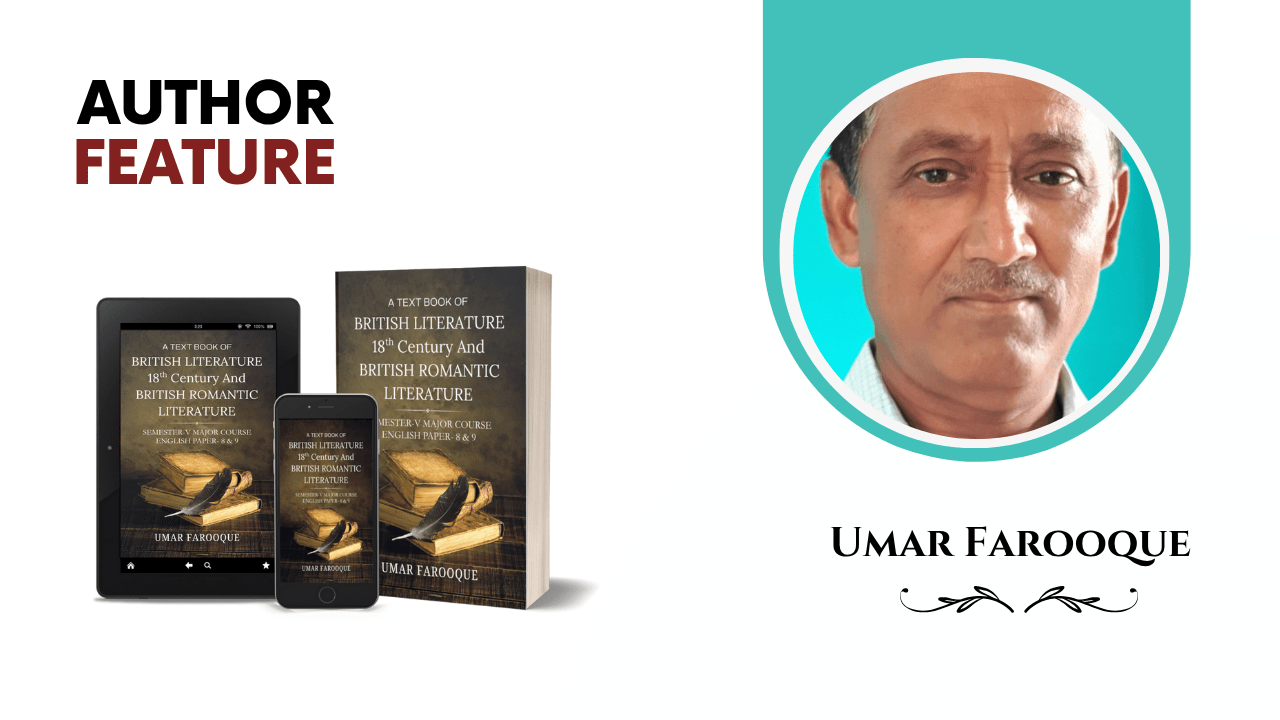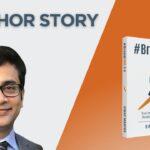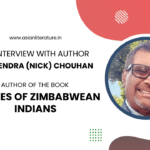
Title: A Text Book of British Literature: 18th Century and British Romantic Literature
Author: Umar Farooque
ISBN: 978-93-7335-227-5
Publisher: Evincepub Publishing
About the author: Umar Farooque is a dedicated scholar of English literature with a deep interest in the evolution of British literary thought and aesthetics. His academic pursuits focus on tracing the transition from the rationalism of the Enlightenment to the emotional depth and creative imagination of the Romantic era. With a strong background in literary criticism and pedagogy, he brings clarity and insight to complex literary movements and their historical contexts. Through his work for MJC English Semester-5th Paper-8th & 9th, Farooque aims to make classic English literature accessible to students, teachers, and general readers, emphasizing both textual analysis and cultural understanding. British Literature: 18th Century and British Romantic Literature reflects his commitment to fostering literary appreciation and critical inquiry among learners and researchers alike.
Q1: How do you think studying 18th-century British literature helps us understand modern society and culture?
Answer: Studying 18th-century British literature helps us understand the roots of modern society, politics, and cultural thought. Writers of that era explored themes like reason, individual rights, morality, and social reform that continue to shape today’s world. Their works reveal how the foundations of democracy, journalism, and modern human values were intellectually and artistically formed.
Q2: What challenges do students face when studying classical English texts today, and how does your book address them?
Answer: Students today often struggle with the complex language, historical distance, and philosophical depth of classical English texts. My book addresses these challenges through simplified explanations, contextual notes, and analytical summaries that make the material more accessible. It bridges academic rigor with clarity, helping learners connect classical ideas to contemporary perspectives and real-life understanding.
Q3: What is the pedagogical philosophy behind your approach to literature in this textbook?
Answer: The pedagogical philosophy behind my approach is rooted in clarity, context, and critical engagement. I believe literature should be taught as a living reflection of human experience, not merely as historical text. Hence, the book encourages analytical thinking, empathy, and interdisciplinary connections—aligning literary study with holistic intellectual development.
Q4: How do you make writers like Swift, Pope, or Wordsworth relevant to 21st-century readers?
Answer: I make writers like Swift, Pope, and Wordsworth relevant by connecting their themes to modern social, political, and emotional realities. Swift’s satire, Pope’s moral insight, and Wordsworth’s celebration of nature all resonate with contemporary issues like media manipulation, ethical decline, and environmental awareness. By highlighting these timeless concerns, the book helps readers see that great literature continues to speak to every generation.
Q5: Do you believe literature still holds the same power to shape human thought as it did in the Enlightenment or Romantic era?
Answer: Yes, I firmly believe literature still holds the same transformative power to shape human thought. While the mediums of expression have changed, the written word continues to awaken conscience, empathy, and imagination. Just as in the Enlightenment and Romantic eras, literature today remains a mirror and a catalyst for individual and social transformation.
Q6: Your work emphasizes both social and philosophical contexts. Why is this integration important for understanding literature?
Answer: Integrating social and philosophical contexts is essential because literature never exists in isolation—it reflects the mind and the milieu of its time. Understanding a writer’s social environment and philosophical outlook deepens our interpretation of their themes and values. This integration allows readers to see literature not just as art, but as a dialogue between thought, society, and human experience.
Q7: How do you interpret the Enlightenment’s focus on reason in contrast to the Romantic era’s emphasis on emotion and imagination?
Answer: I interpret the Enlightenment’s focus on reason as a quest for order, clarity, and intellectual progress, grounded in human rationality. In contrast, the Romantic era’s emphasis on emotion and imagination reflects a reaction to that rationalism—a rediscovery of intuition, creativity, and the spiritual side of life. Together, they illustrate humanity’s ongoing struggle to balance logic with feeling, and intellect with imagination.
Q8: In your opinion, what makes the British Romantic poets so timeless and universally appealing?
Answer: The British Romantic poets are timeless because they touch the deepest layers of human emotion and imagination. Their focus on nature, freedom, individuality, and the inner self speaks to universal human experiences that transcend eras and cultures. Their poetry reminds us of the beauty, mystery, and moral strength found in both the natural world and the human spirit.
Q9: Which literary movements or authors do you believe have been underappreciated by traditional curricula?
Answer: I believe certain transitional movements and lesser-known authors deserve more recognition in traditional curricula. Writers like Charlotte Smith, Oliver Goldsmith, and Anna Laetitia Barbauld, as well as movements like Pre-Romanticism, are often overlooked despite their significant influence. Highlighting such voices enriches literary study by presenting a fuller, more inclusive picture of Britain’s intellectual and cultural evolution.
Q10: How has your academic research influenced the way you frame literary history in this book?
Answer: My academic research has deeply influenced how I frame literary history in this book. It encouraged me to view literature not as a linear progression of styles, but as an evolving conversation shaped by culture, philosophy, and human experience. This perspective allowed me to present each period and writer within a broader intellectual and moral continuum, making literary history both dynamic and meaningful.

